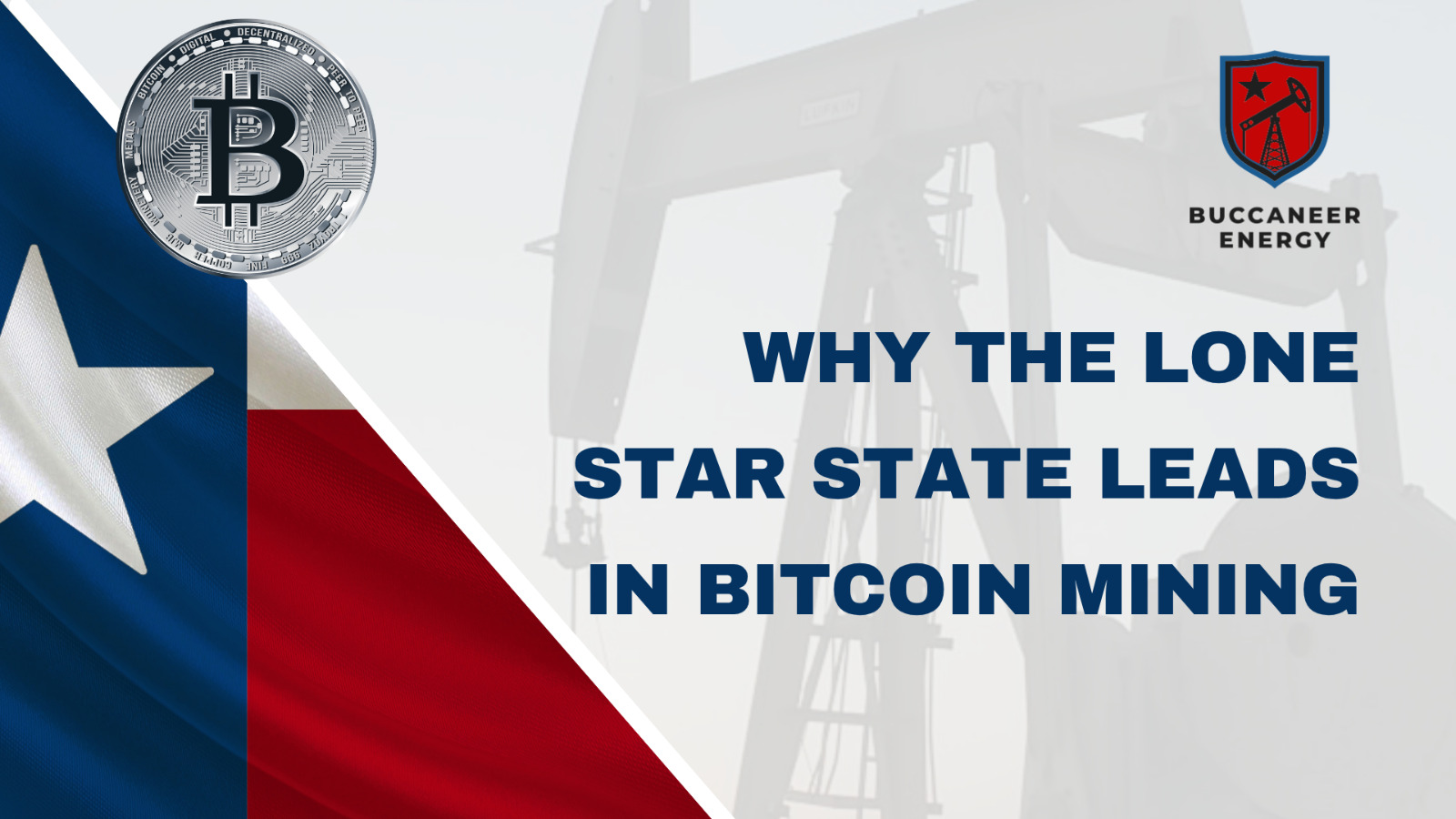Introduction
In September 2021, China, then the global hub for Bitcoin mining, outlawed the activity entirely. Bitcoin mining rigs, the physical machines that secure the Bitcoin network by solving cryptographic puzzles, validating transactions, and appending new blocks, expend computational power in return for Bitcoin and fees. These rigs were exported in bulk from mining hotspots in provinces such as Xinjiang, Sichuan, and Inner Mongolia.
With the exodus of Bitcoin mining infrastructure from China, the United States has become the primary destination for this hardware. Yet no state has capitalised on this shift quite like Texas. Today, the Lone Star State is not only a significant hub of Bitcoin mining in America, with an estimated 40 mines operating in 2025, but also one of the most important globally to the digital asset ecosystem.
In this article, Buccaneer Energy PLC will explore why the home state of our existing oil and gas assets has emerged as one of the world’s largest hubs for Bitcoin mining and why these factors simultaneously offer an ideal environment for our own Bitcoin strategy: to optimise the profitability of our current assets through the capture and processing of flare gas into energy for mining Bitcoin.
With no state income tax and business-friendly regulations, Texas has long been an attractive destination for businesses of all kinds, including those in the digital assets sector. For this article, we will focus on what we believe are the two most important factors that position Texas as one of the most compelling jurisdictions for Bitcoin mining.
Low-Cost Power
One of the most widely held perceptions of Bitcoin mining is that it is highly energy intensive. This is largely true, which makes electricity costs a critical factor in determining the financial viability of any Bitcoin mining operation.
In this context, Texas presents a unique combination of energy grid flexibility and resource abundance that is highly appealing and sought after by Bitcoin mining operations. Unlike most states, its deregulated market structure, overseen by the Electric Reliability Council of Texas, allows large users to purchase wholesale electricity and participate in demand-response programs, switching off during peak demand and selling back their contracted energy at a premium.
However, Texas’s vast oil and gas reserves, accounting for 43% of U.S. crude oil production and 28% of natural gas withdrawals in 2024, provide an alternative power source independent of the state’s energy grid. In fact, Texas’s natural resource deposits are so vast that the state frequently produces more power than it can transmit, resulting in “stranded” energy that is typically burnt off or “flared.” Indeed, half of the natural gas flared in the United States is estimated to be burned in West Texas, simply because there is insufficient transmission infrastructure to deliver it to market, releasing large amounts of carbon dioxide into the atmosphere
For Bitcoin mining, this presents a huge opportunity to convert otherwise wasted gas into electricity and utilize it on-site, independent of the energy grid, to power Bitcoin mining at minimal cost. As such, Texas’s energy abundance allows miners to operate at low cost and independently of the power grid and has the additional benefit of turning an environmental liability into a strategic advantage—simultaneously reducing emissions and securing a cost-efficient power source for Bitcoin mining.
Political Environment
In recent years, regulatory uncertainty has often stifled innovation and growth in the digital assets industry. Texas, however, boasts a consistent political discourse surrounding digital assets, characterized by clarity of position and bipartisan support, with a track record to back it up. Indeed, in April 2022, Texas’s Fort Worth became the first city in the U.S. to officially mine Bitcoin, and since then, the Texas legislature has continued to champion the industry for digital assets.
A key milestone was the passage of House Bill 591 in 2023, which established the legal foundation for Bitcoin miners to utilise flare gas, reducing the environmental impact while creating economic value. This year, Texas also became the third state to establish a strategic Bitcoin reserve, with the SB21 bill passing through the State Legislature with bipartisan support before being signed into law by Governor Greg Abbot on 22 June.
In terms of future outlook, the FLARE Act, introduced to the U.S. Senate by Texan Senator Ted Cruz in April 2025, represents a significant expansion of the state’s efforts at the federal level. The proposed legislation would amend the U.S. Internal Revenue Code to allow full expensing for infrastructure that captures waste gas, specifically targeting the use of this energy for value-added purposes, such as Bitcoin mining. It is worth noting that, as of September 2025, the FLARE Act remains a pending piece of legislation. Its passage, however, would further solidify Texas’s role in the future of sustainable Bitcoin mining.
These developments underscore Texas’s emergence as a leading jurisdiction for innovation, combining pragmatic environmental policy with forward-looking economic strategy. With both state and federal initiatives advancing in parallel, Texas is positioned not only as a supporter of Bitcoin but as an architect of its integration into broader energy and financial systems.
Conclusion
Since 2021, Texas has emerged as a global leader in Bitcoin mining not by chance, but through the convergence of its abundant natural resources, supportive political framework, and willingness to embrace innovation with a pragmatic, pro-business approach. For Buccaneer, these conditions align directly with our strategy: transforming flare gas, once an environmental liability, into a sustainable and profitable energy source for mining Bitcoin.
As federal policy evolves and Texas continues to strengthen its pro-innovation stance, the state is set to remain at the forefront of this industry. In this environment, we see both opportunity and responsibility: to optimise our existing assets, contribute to cleaner energy practices, and play a meaningful role in shaping the future of sustainable, optimised Bitcoin mining.
